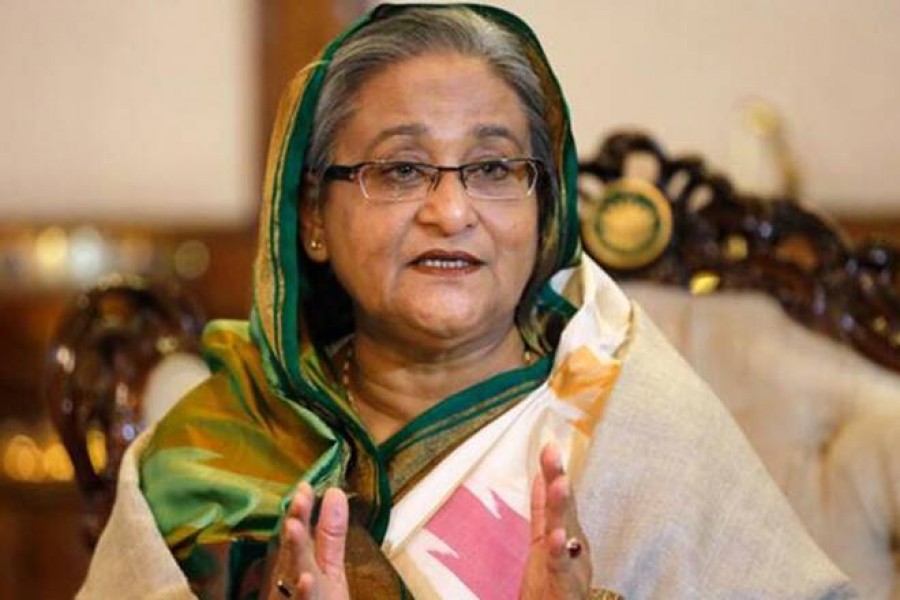Prime Minister Sheikh Hasina on Friday put forward a five-point proposal to the international community to raise global awareness for a resilient and sustainable post Covid-19 world by combating water and disaster challenges.
The Prime Minister made the proposals in her pre-recorded speech in the Fifth UN Special Thematic Session on Water and Disasters in "Building Back Better towards More Resilient and Sustainable Post-COVID-19 World."
"We need to take a comprehensive, result-oriented, focused and adaptive global approach for water security; and it's important to raise political awareness, and share good practices, knowledge, and experiences," she said.
Three other proposals are: Synergies on water management and water policies and its use by nations of the upper and lower basins; focus by the world community on the implementation of the Sendai Framework, the SDGs and the Paris Agreement; and mobilizing financial resources for vulnerable countries to ensure their adequate access to water.
Hasina said the world is confronting the gravest global health crisis of its times due to the Covid-19 pandemic as enormous economic and social disruption caused by the pandemic has slowed down the progress for sustainable development.
She mentioned that the growing scarcity of clean drinking water, outbreak of diseases like cholera and typhoid reminds us of the crucial need for water for peace and development.
"To mitigate the water-related disasters, we've a shared responsibility to create stronger and inclusive international cooperation," the Prime Minister pointed out.
She said Bangladesh is the lower-most riparian country in South Asia, standing on the confluence of three mighty rivers -- the Ganges, the Brahmaputra and the Meghna.
At present, she said, Bangladesh faces two-pronged water-related problems - its surplus and shortage.
During monsoon, Hasina said, 90 per cent water enters Bangladesh from catchments beyond our border inundating our localities while during dry season, a drought-like situation prevails across the country.
"Moreover, the scarcity of safe drinking water is an emerging problem in the coastal areas due to salinity intrusion," she said.
Hasina recalled that Bangladesh has faced several climatic disasters, including the Super Cyclone "Amphan" and monsoon flood that affected about 6.0 million people during the ongoing Covid-19 pandemic.
Similarly, the cyclone "Yaas" inundated 27 sub-districts last month causing damage to crop, fisheries and infrastructure.
Regarding climate change, she said Bangladesh is also one of the most climate vulnerable countries in the world.
"Floods, tidal surges, cyclones, and riverbank erosion are now more frequent. To address these challenges, Bangladesh is taking disaster risk reduction to the next level," she said.
Under the purview of the Disaster Management Act 2012, Standing Orders on Disaster 2019 have been included for ensuring "whole of society approach", Hasina said.
Besides, she said, Bangladesh has revised the National Plan for Disaster Management for the period of 2021 to 2025 in alignment with the Sendai Framework.
The Community Based Disaster Preparedness Model has been developed to ensure an inclusive bottom-up approach to the disaster management system in the country, the PM added.
With the vision of achieving a safe, climate resilient and prosperous Bangladesh delta, Hasina said the government has formulated Bangladesh Delta Plan 2100.
"We've also prepared the Mujib Climate Prosperity Plan for implementing renewable energy and climate resilience projects," she said.
The PM mentioned that the government has taken initiatives to build 885, 000 disaster-resilient houses for the landless, homeless and displaced families across the country.
It has built 16.4 kilometres of sea dykes, 12,000 cyclone shelters and 200,000 hectares of coastal plantation. "Strengthening and raising the height of around 5,700 kilometres of the coastal embankment is underway."
The Prime Minister said the government is in the process of constructing super dykes in the coastal belt to protect millions of people from the impacts of sea level rise, salinity and tidal surges.
"We're also giving utmost importance to greenbelt development. We're planting 30 million saplings this year on the occasion of the birth centenary of Father of the Nation Bangabandhu Sheikh Mujibur Rahman."
As the current chair of the 48-nation Climate Vulnerable Forum, she said, Bangladesh's key focus is going on to uphold the interests of the climate vulnerable countries and promote locally-led adaptation solutions.
"We're working to be transformed from climate vulnerability to climate resilience to climate prosperity."


